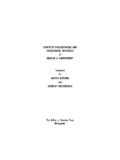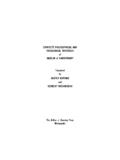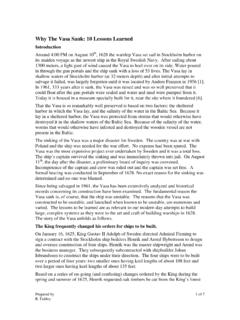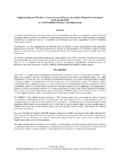Transcription of ON LEARNED IGNORANCE (De Docta Ignorantia) …
1 ON LEARNED IGNORANCE (De Docta Ignorantia) byNICHOLAS OF CUSAThe translation of Book I was made fromDe Docta ignorantia . Die belehrte Unwis-senheit, Book I (Hamburg: Felix Meiner, 1970, 2nd edition), text edited by PaulWilpert, revised by Hans G. translation of Book II was made from De Docta ignorantia . Die belehrte Un-wissenheit. Book II (Hamburg: Felix Meiner, 1967), text edited by Paul translation of Book III was made from Nicolai de Cusa Opera Omnia, Vol. I:DeDocta ignorantia (Leipzig: Fexix Meiner, 1932), text edited by Ernst Hoffmann andRaymond Klibansky. For purposes of standardization the margin numbers in the Eng-lish translation are taken from De Docta ignorantia . Die belehrte Unwissenheit, BookIII (Hamburg: Felix Meiner, 1977), text edited by Raymond Klibansky. Footnote ref-erences are also to this edition, 1985 (2nd printing, 1990).
2 Library of Congress Catalog Card Number 80-82907 ISBN 0-938060-30--9 (cloth edition)ISBN 0-938060-27-9 (paperback edition)Printed in the United States of AmericaCopyright 1981 by The Arthur J. Banning Press, Minneapolis, Minnesota rights TITLES FOR BOOK ONE1. How it is that knowing is Preliminary clarification of what will The precise truth is The Absolute Maximum,with which the Minimum coincides, is un-derstood The Maximum is The Maximum is Absolute The trine and one Eternal The eternal procession of An understanding of trinity in oneness transcends all assists us very greatly in apprehending various di-vine [truths].12. The way in which mathematical signs ought to be used in our The characteristics of a maximum, infinite An infinite line is a The maximum triangle is a circle and a In a symbolic way the Maximum is to all things as a maximumline is to [all] Very deep doctrines from the same [symbolism of an infinite line].
3 18. From the same [symbolism] we are led to an understanding of theparticipation in The likening of an infinite triangle to maximum Still more regarding the Trinity. There cannot be fourness, [five-ness], etc., in The likening of an infinite circle to How God's foresight unites The likening of an infinite sphere to the actual existence of The name of God; affirmative The pagans named God in various ways in relation to Negative IPrologue[Nicholas of Cusa] to his own venerable teacher, the divinelybeloved and most reverend father, Lord Julian,1most worthycardinal of the holy Apostolic very great and indeed very proven Genius will rightly wonderwhat to make of the following fact: viz., that when, quite imprudent-ly, I endeavor to publish my foreigner's-foolishness, I select you as ajudge.
4 [You will wonder about my treating you] as if you retainedsome leisure (you, who by virtue of your cardinal's duties at the HolySee are extremely busy with especially important public affairs) andas if, given your most thorough knowledge of all the Latin writers whohave hitherto become illustrious (and [your] recent [knowledge] ofthe Greek writers as well), you could be drawn by the novelty of itstitle to this presumably very foolish production of mine I, whosequality of intellect has long been very well known to you. This won-dering shall, I hope, induce your knowledge-hungry mind to take alook. [You will wonder] not because you think that something previ-ously unknown might be presented here; rather, [you will marvel] atthe boldness by which I was led to deal with LEARNED IGNORANCE .
5 Forthe naturalists state that a certain unpleasant sensation in the openingof the stomach precedes the appetite in order that, having been stim-ulated in this way, the nature (which endeavors to preserve itself) willreplenish itself. By comparison, I consider wondering(on whose ac-count there is philosophizing)2to precede the desire-for-knowing inorder that the intellect (whose understanding is its being) will perfectitself by the study of things, even if they be monstrous,are accustomed to move us. For this reason, 0 unparalleled Teacher,deem, according to your kindness, that something worthwhile lies hid-den herein; and in regard to divine matters receive from a German amode of reasoning such as the following a mode which great laborhas rendered very pleasing to One: How it is that knowing is see that by the gift of God there is present in all things a natural124desire to exist in the best4manner in which the condition of eachthing's nature permits this.
6 And [we see that all things] act toward thisend and have instruments adapted thereto. They have an innate senseof judgment which serves the purpose of knowing. [They have this]in order that their desire not be in vain but be able to attain rest inthat [respective] object which is desired by the propensity of eachthing's own nature. But if perchance affairs turn out otherwise, this[outcome] must happen by accident-as when sickness misleads tasteor an opinion misleads reason. Wherefore, we say that a sound, freeintellect knows to be true that which is apprehended by its affection-ate embrace. (The intellect insatiably desires to attain unto the truethrough scrutinizing all things by means of its innate faculty of infer-ence.) Now, that from which no sound mind can withhold assent is,we have no doubt, most true.
7 However, all those who make an inves-tigation judge the uncertain proportionally, by means of a comparisonwith what is taken to be , every inquiry is comparative and uses the means ofcomparative , when, the things investigated are able tobe compared by means of a close proportional tracing back to whatis taken to be [certain], our judgment apprehends easily; but when weneed many intermediate steps, difficulty arises and hard work is re-quired. These points are recognized in mathematics, where the earli-er propositions are quite easily traced back to the first and most evi-dent principles but where later propositions [are traced back] withmore difficulty because [they are traced back] only through the me-diation of the earlier ones. Therefore, every inquiry proceeds by meansof a comparative relation, whether an easy or a difficult one.
8 Hence,the infinite, qua infinite, is unknown; for it escapes all comparative since comparative relationindicates an agreement in someone respect and, at the same time, indicates an otherness, it cannot beunderstood independently of number. Accordingly, number encom-passes all things related comparatively. Therefore, number, which isa necessary condition of comparative relation, is present not only inquantity but also in all things which in any manner whatsoever canagree or differ either substantially or accidentally. Perhaps for this rea-son Pythagoras deemed all things to be constituted and understoodthrough the power of the precise combinations in corporeal things and the con-gruent relating of known to unknown surpass human reason-to suchDe Docta ignorantia I, 1345an extent that Socrates seemed to himself to know nothing except thathe did not know.
9 And the very wise Solomon maintained that all thingsare difficult and unexplainable in a certain other man ofdivine spirit says that wisdom and the seat of understanding are hid-den from the eyes of all the the very profound Aristo-tle, in his First Philosophy, asserts that in things most obvious by na-ture such difficulty occurs for us as for a night owl which is trying tolook at the , if the foregoing points are true, then sincethe desire in us is not in vain, assuredly we desire to know that wedo not know. If we can fully attain unto this [knowledge of our igno-rance], we will attain unto LEARNED IGNORANCE . For a man-even one verywell versed in learning-will attain unto nothing more perfect than tobe found to be most LEARNED in the IGNORANCE which is distinctively more he knows that he is unknowing, the more LEARNED he will this end I have undertaken the task of writing a few things aboutlearned Two: Preliminary clarificationof what will I am going to discuss the maximum learning of IGNORANCE , Imust deal with the nature of , I give the name Maximum to that than which there cannot be anything greater.
10 Butfullness befits what is one. Thus, oneness which is also being co-incides with Maximality. But if such oneness is altogether free fromall relation and contraction, obviously nothing is opposed to it, sinceit is Absolute Maximality. Thus, the Maximum is the Absolute Onewhich is all things. And all things are in the Maximum (for it is theMaximum); and since nothing is opposed to it, the Minimum likewisecoincides with it, and hence the Maximum is also in all things. Andbecause it is absolute, it is, actually, every possible being; it contractsnothing from things, all of which [derive] from it. In the first book Ishall strive to investigate incomprehensibly above human reason-thisMaximum, which the faith of all nations indubitably believes to beGod. [I shall investigate] with the guidance of Him who alone dwellsin inaccessible light.







